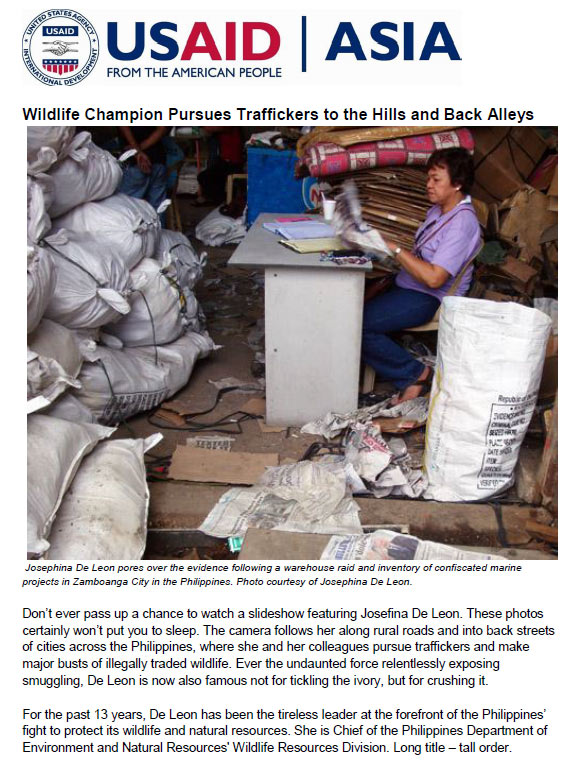Don’t ever pass up a chance to watch a slideshow featuring Josefina De Leon. These photos certainly won’t put you to sleep. The camera follows her along rural roads and into back streets of cities across the Philippines, where she and her colleagues pursue traffickers and make major busts of illegally traded wildlife. Ever the undaunted force relentlessly exposing smuggling, De Leon is now also famous not for tickling the ivory, but for crushing it.
For the past 13 years, De Leon has been the tireless leader at the forefront of the Philippines’ fight to protect its wildlife and natural resources. She is Chief of the Philippines Department of Environment and Natural Resources' Wildlife Resources Division. Long title – tall order.
She is a well-known television news personality from coverage ranging from her role in saving captured crocodiles and making them a huge draw for ecotourists to leading raids and announcing seizures of protected wildlife and timber.
The work of De Leon and her agency is vital for her country and the world. The Philippines is a global biodiversity bonanza, but species found here are under constant threat. The 7,100 islands that make up the archipelago have lost over half of their forest cover in the past century, and violent criminal gangs that traffic in protected plants, timber and wildlife have killed more than 20 out of the country’s 2,000 wildlife rangers in the past three years. Limited resources and ongoing corruption have further complicated efforts to manage protected natural resources.
De Leon’s steely resolve and leadership have helped save the day, not to mention the Philippines’ rich and diverse wildlife. Her contributions have led to at least 30 national policies, rules and regulations, four conservation plans and eight publications on wildlife conservation and management. She was instrumental in setting up the Philippines’ National Wildlife Research and Rescue Center and has led a multi-agency approach to combat illegal wildlife trade.
And it was De Leon who pushed hard for the Philippines to be the first country in Asia to crush its five-ton seized ivory stockpile valued at over $10 million. The success of this event, which was supported by USAID through local partners and drew global news interest, inspired other countries to hold similar crush events of their own: the United States, China and France. Hong Kong, Tanzania, Chad and Togo are making plans to do the same.
“This incredible woman should be recognized widely for her passion and commitment to counter wildlife trafficking,” said USAID Natural Resources Officer Danielle Tedesco. “She is a true conservation champion.”
De Leon sees her wildlife career path as a calling. One of nine children, she gained an appreciation of her natural surroundings in rural Batangas Province at an early age.
“I grew up in a poor family, with parents who were not able to finish even a primary education,” she said. “But having farmer parents had exposed me to the beauty of nature – a great expanse of fields, tall trees, green mountains, flowing waters on the rivers, eagles perched on tall dead trees, humming bees, beautifully colored butterflies, and quails nesting on hay.”
Beyond protecting wildlife, De Leon also believes it is important to educate young girls in particular on how they can be better stewards of their natural resources. “People at a young age should be taught to care for the environment and the natural resources that sustain life. We need environmental champions. Thousands of children are born daily. A mother who teaches good things and values to her kids could make a difference. Leaders are not born; they are developed. Women also excel in community development. But consistency, persistence and determination are key factors to becoming leaders.”








Comment
Make a general inquiry or suggest an improvement.